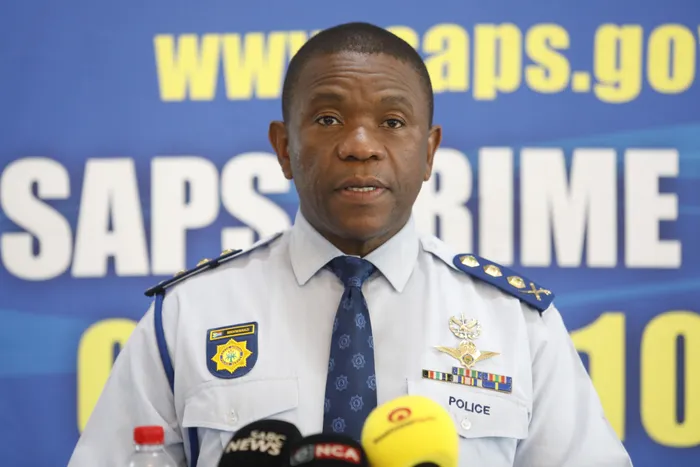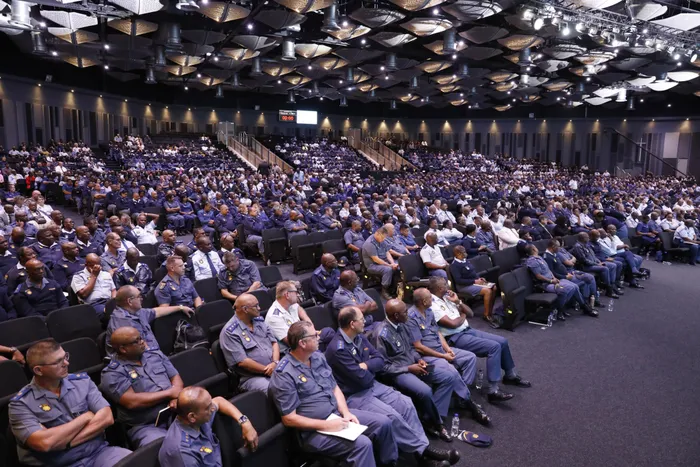KZN top cop's bold crime-fighting strategy

KwaZulu-Natal police commissioner Lieutenant General Nhlanhla Mkhwanazi.
Image: Doctor Ngcobo / Independent Newspapers

KwaZulu-Natal police commissioner Lieutenant General Nhlanhla Mkhwanazi convened a meeting with all commanders and commissioned officers within the South African Police Service in the province on Tuesday.
Image: Doctor Ngcobo / Independent Newspapers
AS THE KwaZulu-Natal Provincial Police Commissioner, Lieutenant-General Nhlanhla Mkhwanazi fine-tunes and hones his crime-fighting strategy and machinery, community policing forums have praised his efforts and called for the SAPS to be more robust in tackling crime.
Mkhwanazi laid out a engaging plan to tackle crime and strengthen police performance in the province during his meeting with all the station commanders and commissioned officers at the Durban Christian Centre Jesus Dome, Mayville, on Tuesday.
Mkhwanazi, who has been lauded in many quarters for his no-nonsense approach to crime-fighting, reflected on the successes of the past year, and set out priorities for the new financial year. Despite some successes, the crime-infested eThekwini and Pietermaritzburg continues to give Mkhwanazi a headache.
Mkhwazani stated the province had seen notable improvements in several key crime categories.
“The province has shown a decrease in cases of murder, robbery with aggravating circumstances, car and truck hijacking, as well as robbery at business and residential premises,” he said.
Mkhanazi said the positive results were a product of strategic efforts and the dedication of frontline officers.
In the previous financial year, KZN police arrested over 144 000 suspects and recovered more than 3 600 firearms and over 51 000 rounds of ammunition.
However, not all trends were encouraging as crimes such as rape and assault, both common and grievous, remained troubling.
“Sexual assault cases continue to be a serious concern. The slight increase we've observed demands intensified cooperation between police and the community,” said Mkhwanazi.
He pointed to social issues such as alcohol abuse, intolerance, and impatience as key contributors to the spike in assault cases.
He singled out the Chatsworth area as a hotspot for conflict among neighbours and pals and urged residents to seek peaceful resolutions to quarrels.
“Road rage and domestic altercations are increasingly resulting in assault charges, often with both parties claiming self-defence,” he said.
Despite the challenges, public sentiment towards police work in the province has improved, with Mkhwanazi announcing that social media feedback and community interactions reflected growing trust.
“We’re receiving more letters and calls of appreciation. These gestures are motivating, especially in a profession where criticism is more common than praise,” he said.
Mkhwanazi conceded, however, that the province still faced significant crime hurdles.
As reasons, he cited the number of police officers, which has dropped to 19 600, down from 25 000 just a few years ago, leaving a reduced force responsible for a population of 12.4 million in KwaZulu-Natal, excluding documented and undocumented immigrants.
In the past financial year, the province lost 893 police personnel, including 805 functional officers.
Among those lost were six officers who died in the line of duty, four from criminal shootings and two in vehicle accidents.
Meanwhile, 106 officers were dismissed for misconduct, corruption, or other disciplinary issues.
Efforts to reduce civil claims against the police have begun to bear fruit, with damages claims dropping from 3754 to 3057 in the last financial year.
However, over R3.3 billion in claims were still registered, with the province paying out R154 million in damages.
Mkhwanazi emphasised the importance of discipline and command in further lowering this financial burden.
In a bid to forge community engagement in crime-busting initiatives, Mkhwanazi said all station commanders were now required to hold monthly public meetings, not just with community policing forum structures, but with broader communities.
“These meetings aim to improve transparency and foster collaboration on local policing strategies,” he said.
Mkhanazi also stressed that internal wellness and fitness were top priorities to keep police officers fit and healthy.
Over 95% of operational members have completed their annual physical assessments, and 93% have been certified in firearm competence, said Mkhwanazi.
He concluded: “We know the road ahead is tough, but with discipline, community support, and focus, we can achieve great things, even with limited resources.”
eThekwini Ratepayers and Residents Association president, Ish Prahladh, a former CPF chairperson of Reservoir Hills for 15 years, called for SAPS to join hands with the Metro Police in fighting crime.
“If they do this, I promise you we will see a significant drop in crime. We as citizens must help police to fight crime by reporting crime that takes place in our areas.”
Thami Ngcobo, a CPF chairperson in Lamontville, agreed.
“As residents, we should help the police to arrest criminals. But some of us decide to help thugs to evade justice. This has to stop.”
Crime expert and author Mary de Haas has repeatedly said that effective crime fighting should start from inside the SAPS' ranks.
“Effective crime fighting should start with fixing crime intelligence, which has been corrupted by corrupt police and some politicians for their benefit,” said de Haas.
WhatsApp your views on this story at 071 485 7995
DAILY NEWS
